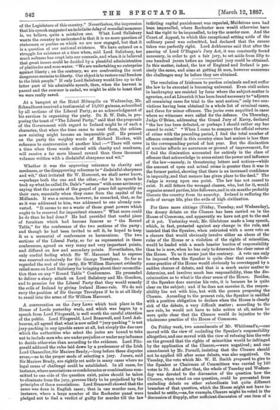For three more sittings (Friday, Tuesday, and Wednesday), the dreary
debate on the Closure has been carried on in the House of Commons, and apparently we have not got to the end of it yet. Yesterday week, Mr. Gladstone made a long speech, which, in fact, protested against any change in the rule, and insisted that the Speaker, when entrusted with a mere veto on a closure that would obviously involve either an abase of the rules of the House or a violation of the rights of minorities, would be loaded with a much heavier burden of responsibility than he is now, when be has only to determine the clear sense of the House. To ns it seems just the contrary. A veto can only be imposed when the Speaker is quite clear that some whole- some practice of the House would obviously be overstepped by a sudden closure of debate, and that is a ranch easier matter to determine, and involves much less responsibility, than the dis- crimination as to what is the clear sense of the House. Besides, if the Speaker does exercise his veto, it is because he is quite clear on the subject; and if he does not exercise it, the respon- sibility lies not with him, but with the person proposing the Closure. According to the present rule, the Speaker is saddled with a positive obligation to declare when the House is clearly sick of the debate, a very difficult matter; according to the new rule, he would not have to take action at all, unless he were quite clear that the Closure would do injustice to the wholesome practice of the House of Commons.


































 Previous page
Previous page